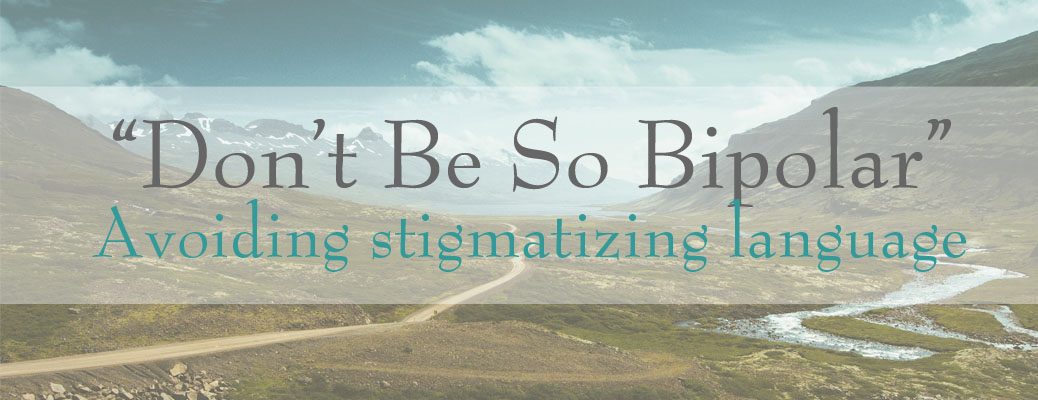What is stigma? According to the National Alliance on Mental Illness (NAMI), stigma is an attempt to label. It is a mark of shame or disgrace that results in discrimination. “Stigma” is a buzz word in the mental health field. We hear national and local organizations talking about it and for some of us, it’s become part of our everyday vernacular. Even celebrities are beginning to give voice to the movement to minimize stigma.
Stigma follows mental illness like a moth to a flame and our collective assumptions and stereotypes about mental illness have repercussions at every phase of life. “The illness is self-stigmatizing,” says Jessie Close, actress Glenn Close’s sister, “If mothers found out I was living with bipolar disorder, I was afraid they wouldn’t let their daughters play with my daughter.”
Is it enough to know that stigma exists and to “like” a social media post that has an image with a quote on it?What we spend our time reading or watching on television must convey a language of compassion and support. Our everyday language with co-workers, friends and family must support healing and recovery for those living with mental illness.
People in powerful positions do not normally talk about their own mental illness. Why not? We hear of actors battling cancer or having heart problems.Clearly, if one in five people are living with mental illness this means celebrities, politicians, famous athletes are too. This is just another reason we must take care in the things we are endorsing online and on television. Television shows and movies exacerbate the stigma and can show the extremes of a diagnosis without including a teaching component for audiences that aren’t educated in mental illness.
Have you seen any television shows lately that mock someone with cancer? Diabetes? Is that something to make fun of? No. Clearly we’ve decided, as a society, that physical illness is generally something that is off limits for mockery or jest. It is clear, however, that mental illness hasn’t received that same clout, even though we are hearing so much about de-stigmatizing mental illness we still see movies and television shows that portray mental illness in a very dangerous light. We see headlines that contribute mass murder to mental illness, an incomplete portrayal at best and a propagator of stigma at worst.
Those of us in the mental health community are working extremely hard to minimize stigma, because we know how damaging it is. How many 5K’s have you read about that are raising funds for Schizophrenia research? Depression research? Bipolar research? Not many. On the other hand, I’m certain most of you have heard of “The Donna” run for breast cancer research or Relay For Life. According to the World Health Organization‘s Disability Weights scale, severe schizophrenia, severe depression and severe PTSD are just as debilitating as quadriplegia, severe chronic bronchitis, emphysema and AIDS. Mental illnesses are just as impactful as other health conditions and they should be acknowledged as such by our words and actions.
Stigma can lead to:
- LACK OF or inadequate insurance coverage for mental health services
- SUSPICION and VIOLENCE against people living with mental illness and their families
- DISCRIMINATION
Which can lead to fear of disclosure, lack of knowledge, rejections, isolation, self-harm and even suicide. To make a mockery out of a debilitating mental illness can have devastating effects on everyone and we stigma fighters are working really hard to watch what we say because of it. Here’s what you can do:
- Use respectful language. Do not refer to people as “crazy” or “psyhco”. Contrary to popular belief you do not have “OCD” if you just can’t stand a messy desk. Someone or something isn’t “schizoprehnic” because it seems chaotic. I once overhead licensed mental health professionals tell a story about her colleagues making fun of someone who had a Bipolar diagnosis and referring to a man diagnosed with Schizophrenia (who was not taking his medication) as “schiz off their meds”. Even people working in the field of mental health are not using caution with their words, thus facilitating the stigma.
- Educate yourself on mental illness. Get a taste of lived experience by reading a book written by someone in recovery. Become a volunteer and get to know people who live with mental illness. Learn more about the struggles that a person goes through and help create empathy instead of scorn or fear.
- Be careful with what you are promoting on social media. Discover the source of an article and find out if it’s credible. Have a conversation with someone living with mental illness about a TV show or a movie that conveys someone living with a mental health diagnosis. If your children or teenagers are watching TV programs that talk about mental illness, try to encourage empathy by talking to them about what’s happening with the characters.
Find the teachable moments, but be humble and aware. Those of us living with debilitating Depression, Bipolar Disorder, Schizophrenia, Delusions, Hallucinations and Anxiety Disorders need you, because even though one in five people are living with mental illness, two thirds of all people with a diagnosable mental illness are still not seeking treatment. We have a long way to go and every word counts.




Recent Comments